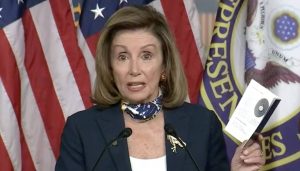Our federal government may have finally lost any semblance of moderation and fiscal responsibility, if it had any, to begin with. In a 220-212 party-line vote, the U.S. House of Representatives passed a $3.5 trillion budget resolution while simultaneously advancing $1 trillion bipartisan infrastructure bill.
By passing this legislation, the Democrats may now write formal legislation that can pass without one Republican vote. The political sleight of hand is known as budget reconciliation, a process that allows the passage of a bill using a simple majority versus the 60% traditionally needed.
But it goes deeper than that. As reported by The House Committee on the Budget, “Reconciliation starts with the congressional budget resolution. The budget cannot be stalled in the Senate by filibuster, and it does not need the President’s signature.” Let that sink in a moment. Using this political maneuver, the Democrats can bypass multiple checks and balances that are explicitly listed in the U.S. Constitution, thereby making quick work of codified traditions and institutions that have governed and guided our republic for more than 200 years.

To grasp the gravity of the situation, it’s important to understand two things. First, the history of using budget reconciliation, and second, the inherent dysfunctionality of our current use of the budget reconciliation process. The reality is that both parties have used budget reconciliation as means to consolidate legislative efforts while minimizing political resistance.
The American Enterprise Institute (AEI) explains, “Instead of being forced to vote on several bills containing unpopular tax hikes or spending cuts, reconciliation allowed Congress to vote on one or two bills that could be sold as reducing expected budget deficits by the aggregated savings of their various and sundry provisions.” Created by the 1974 Congressional Budget and Impoundment Control Act, presidents Carter, Reagan, Bush (43), Clinton, Bush 45, Obama, and Trump employing the strategy to push through their respective agendas.
In fact according to the Center on Budget and Policy Priorities (CBPP),” Policymakers have enacted 21 budget reconciliation bills since 1980.” One of the important distinctions between budget reconciliation and traditional legislation is the ability to offer amendments.
As CBPP reports “When the full House or Senate considers a reconciliation bill, amendments may be offered. But the Congressional Budget Act generally prohibits consideration of any amendment that would cost money — that is, raise spending or cut taxes without fully offsetting the cost.”
Aside from the technical nature of budget reconciliation, the bigger problem is the spirit in which it is being used. Starting in the 90s under Bill Clinton, budget reconciliation became less about facilitating the legislative process and reducing unnecessary procedural and bureaucratic hurdles and more about using it as a partisan weapon to mow down political opposition in a manner inconsistent with how controversial pieces of legislation are typically approached, i.e., with healthy dissension and debate, the hallmarks of a healthy democracy.
An article by Politico puts it this way: “The long-term implications of this shift were not visible at the time, but it has had wide-ranging and trans-formative effects on the way Congress works—or doesn’t. Reconciliation has helped to entrench congressional gridlock, discouraged bipartisan lawmaking, made it more difficult for complicated bills to become law and made budget deficits more inevitable.”
The Brookings Institute agrees, stating, “Although the reconciliation process originally was viewed as a way to reduce budget deficits by cutting projected spending and raising revenues, it has been used to expedite passage of tax cuts that increase budget deficits.”
From this perspective, budget reconciliation has become one more way each of the parties undermines the input of the other. In doing so, it sets the stage for further partisan entrenchment and opposition, as well as future uses of the process in a reprisal manner, thus all but guaranteeing a tit-for-tat dynamic that colors all future legislative efforts. As AEI points out:
“The U.S. remains in the grip of a public health and economic crisis. It is important for the nation’s policy making process to demonstrate it can respond as necessary to protect lives and lessen the financial hardship. A strong bipartisan bill to start a new presidency would send a signal that the nation’s governing institutions are returning to an ethic of putting the country’s urgent and pressing needs ahead of narrower interests.”
Given the recent history of budget reconciliation in conjunction with an increasingly polarized electorate, bipartisanship isn’t a likely outcome, which means Democrats will probably employ the budget reconciliation process with full vigor, regardless of the consequences.
This ethos has been building for several decades, according to Daniel Galvin, Associate Professor of Political Science at Northwestern University, who writes, “Beginning in the late 1970s, U.S. presidents began to deal with an increasingly polarized, partisan environment. Expectations grew that they would publicly engage in partisan behavior, such as vigorously campaigning for their party members or engaging in combative rhetoric with their political foes. In this context, presidents have been increasingly rewarded for acting in an overtly partisan fashion.”
So in reality, our parties are merely representing our deeply ingrained political standings, which are inherently reinforced by the media outlets and pushed by highly partisan political interest groups. The end result is that our leaders end up mirroring this pathetic political drama that is played out like two fighters trading punches in the hopes of impressing their onlookers.
Or as Politico states, “We’re stuck on something of a hamster wheel: Gridlock makes reconciliation a more attractive option; reconciliation has thwarted goodwill attempts at bipartisan lawmaking; the inability to pass bipartisan bills makes gridlock more likely; and the cycle continues.”
I won’t pretend I know how to actually fix this mess, but here are some suggestions. First of all, smaller, targeted bills that have a specific economic or social focus are better than sweeping legislation packages because they are more likely to receive bipartisan support. Secondly, don’t create artificial interdependence among bills by tying their fates to one another, such as the Democrats are now doing with immigration and spending. Finally, introduce a sort of line-item veto giving each party a limited ability to strip out a very finite number of items it deems as a no-go.
Meanwhile, hold on to your wallets, because this current plan uses highly subjective projections of budget revenues, and if we have learned anything from the recessions caused by the housing investment sector as well as the COVID-19 pandemic, we never know when things can go belly up.
At Newsweed.com, we adhere to three simple principles: truth, balance, and relatability. Our articles, podcasts, and videos strive to present content in an accurate, fair, yet compelling and timely manner. We avoid pushing personal or ideological agendas because our only agenda is creating quality content for our audience, whom we are here to serve. That is why our motto is ”Rolling with the times, straining for the truth.”
Your opinion matters. Please share your thoughts in our survey so that Newsweed can better serve you.
Charles Bukowski, the Los Angeles beat poet that captured the depravity of American urban life once said, “There is something about writing poetry that brings a man close to the cliff’s edge.” Newsweed is proud to stand in solidarity and offer you a chance to get close to the cliff’s edge with our first Power of Poetry Contest. Are you a budding bard, a versatile versifier, a rhyming regaler? Do you march to the beat of iambic pentameter, or flow like a river with free verse? If so, here’s your opportunity to put your mad poetic chops to the test. Enter our poetry contest for bragging rights and an opportunity to win some cash!






